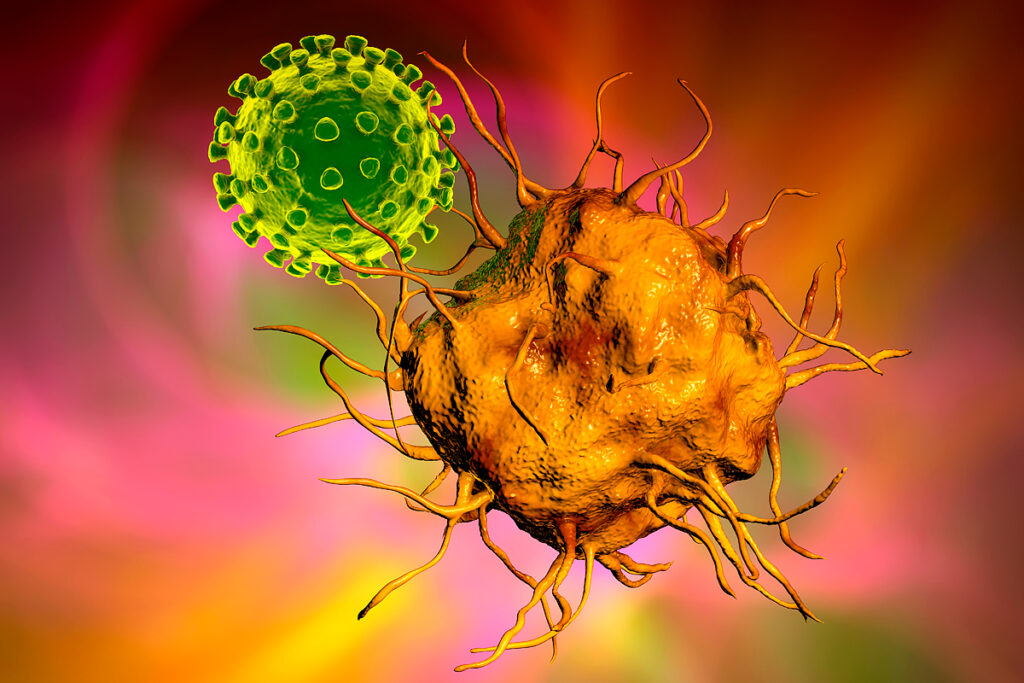The pathogenesis of COVID-19-the occurrence, development, and recovery after the disease is closely related to the interferon system’s work.
The SARS-CoV-2 coronavirus, which causes the 2019 coronavirus disease (COVID-19), most often enters the body through the respiratory tract. When the virus enters the nose, bronchi, or lungs’ epithelial cells, these cells begin to produce interferon molecules (IFN). Interferon triggers and stimulates all mechanisms of antiviral protection. The IFN system principles are described in the article “The role of interferons in the evolution of vertebrates“.
How SARS-CoV-2 affects the interferon system
The SARS-CoV-2 coronavirus is very uncomfortable among healthy cells if interferon type I (IFN-1) molecules are nearby. This feature of SARS-CoV-2 was demonstrated in a cell model by American virologists from New York and Texas universities. When the scientists pretreated the cells with type I interferon, the virus concentration was 1,000 times lower 24 hours after infection than untreated cells. 48 hours after illness – less than 10,000 times.
SARS-CoV-2 learned to suppress the interferon system at various stages of its operation and has at least 6 proteins to survive. Some viral proteins interfere with the synthesis of interferon in cells. Others interfere with the biochemical processes that occur when the IFN is stimulated. Still, others-inhibit the production of antiviral proteins by cells.
Thus, by suppressing only one interferon system, the coronavirus slows down the innate immune system, multiplies rapidly and affects almost all vital organs and tissues: the heart, kidneys, blood vessels, liver, lungs, hematopoietic organs, endocrine and nervous systems, and the gastrointestinal tract.
Prevention and treatment of COVID-19 with interferon drugs
The ability of type I interferons to suppress the reproduction of coronavirus in healthy cells is used to prevent COVID-19, reduce mortality and severity of the disease, and accelerate recovery.
Prevention of coronavirus infection is essential for doctors and people with weakened immune systems.
Doctors are in the professional risk group for COVID-19. Already 2 months after the start of the pandemic, Chinese specialists working in the departments of patients with COVID-19 began to use nasal interferon preparations (nasal drops) to prevent the disease. Comprehensive preventive measures, including nasal IFN-1, reduced the incidence of new coronavirus infection among doctors from 90% to ~0%. The first study of the effectiveness of IFN-1 to prevent COVID-19 was conducted in the epicenter of the pandemic, Wuhan (China). It showed zero morbidity among 2,944 doctors in the 28 days of the study.
The second important risk group is people with weakened immune systems. They are more easily infected with COVID-19, are heavier and are ill for longer. In severe cases, the disease becomes chronic and can last for several months. During chronic illness, the SARS-CoV-2 coronavirus mutates more intensively. Some of these mutations can become very dangerous. In the UK, the new strain appeared precisely according to this scenario.
To protect this group of people, nasal IFN-1 is also used in some countries around the world. For example, in Cuba, there are people with chronic kidney disease who cannot maintain self-isolation. These people regularly receive a hemodialysis procedure in medical institutions. Cuban doctors have published the results of a study in a small group of such patients: not a single case in the 45 days of the study.
Treatment of coronavirus infection with interferon is still at the stage of clinical experiments. For example, a study by scientists from China, Australia and Canada shows that treatment with nebulized (in the form of an aerosol) interferon type I reduces hyperinflammation in patients with COVID-19 and accelerates their recovery. A similar study conducted in the UK also says that IFN-1 increases the chances of clinical improvement on day 15 of the disease. In a survey of Iranian doctors, subcutaneous administration of IFN-1 reduced mortality by 2 times and accelerated recovery.
The most critical factor in the successful treatment of COVID-19 with interferon drugs is the start time of treatment – within 5 days of the onset of symptoms. If you start treating later, the course of the disease will be more challenging. That is evidenced by a large cohort study of 730 patients conducted in China. Following this study, IFN-1 was included in the national COVID-19 treatment guidelines.
COVID-19 risk groups and their interferon system
COVID-19 is asymptomatic or mild in approximately 80% of infected patients. In these people, the disease develops mainly in the respiratory organs: the nose, bronchi, and lungs. As a rule, these are children, young people and healthy middle-aged people. Their immune system works well, so the interferon system manages to activate in time, even despite the counteraction of the SARS-CoV-2 coronavirus.
Unfortunately, the remaining 20% of COVID-19 cases are at risk. They have a high probability of a severe form of the disease, which requires intensive therapy and artificial ventilation. These are people with reduced immunity: the elderly, obesity, chronic kidney disease, heart disease, diabetes. The risk of severe disease in these people is associated with a dysregulation of the interferon system.
Scientists worldwide studied the interferon system’s work in patients with varying degrees of severity of COVID-19. For example, French virologists from the University of Paris and the Louis Pasteur Institute compared the activity of IFN-1 in four groups of people:
- patients with mild or moderate disease;
- patients with severe form;
- patients with a critical condition of COVID-19;
- in healthy people who were included in the control group.
As a result, the researchers found that the concentration of IFN-1 in the blood decreases in patients with increasing disease severity. A series of analyzes performed at different periods of the patients’ illness showed a clear dependence on the production of IFN-1 on the severity of the disease. Patients with mild to moderate severity had consistently high levels of interferon. Severe patients have a high level of IFN-1, which rapidly decreased. Critical patients have consistently low or no interferon levels.
Genetic mutations and the interferon system
A particular risk group for COVID-19 is people with genetic mutations that inhibit the interferon system.
An international team of scientists from 14 countries has conducted a large-scale study of congenital genetic abnormalities that affect coronavirus disease. Virologists compared the decoded genome of 659 patients of different nationalities with a severe form of COVID-19 with the genome of 534 patients with a mild or asymptomatic form of the disease.
Scientists have identified 24 gene mutations:
- prevented the synthesis of IFN-1 by the body’s cells;
- reduced the susceptibility of cells to interferon molecules;
- they stimulated the production of antibodies that promote the destruction of their interferon.
These mutations were found in 3.5% of patients with COVID-19. Moreover, all patients with these mutations had a severe form of the disease.
The scientists note that the results obtained should be considered when treating COVID-19 with blood plasma transfusions of recovering patients. If the transfused plasma contains antibodies to IFN-1, such treatment can aggravate the disease’s course.



